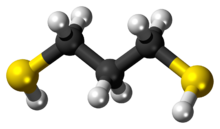Chemistry:1,3-Propanedithiol

| |
| Names | |
|---|---|
| Preferred IUPAC name
Propane-1,3-dithiol | |
| Other names
1,3-Dimercaptopropane
| |
| Identifiers | |
3D model (JSmol)
|
|
| ChEBI | |
| ChEMBL | |
| ChemSpider | |
| EC Number |
|
PubChem CID
|
|
| RTECS number |
|
| UNII | |
| UN number | 3336 |
| |
| |
| Properties | |
| C3H8S2 | |
| Molar mass | 108.22 g·mol−1 |
| Appearance | Colorless liquid |
| Density | 1.078 g/cm3 |
| Melting point | −79 °C (−110 °F; 194 K) |
| Boiling point | 169 °C (336 °F; 442 K) |
| slight | |
| Solubility in solvents | all organic solvents |
Refractive index (nD)
|
1.539 |
| Structure | |
| 0 D | |
| Hazards | |
| Main hazards | stench |
| GHS pictograms | 
|
| GHS Signal word | Warning |
| H302, H315, H319, H335 | |
| P261, P264, P270, P271, P280, P301+312, P302+352, P304+340, P305+351+338, P312, P321, P330, P332+313, P337+313, P362, P403+233, P405, P501 | |
| Flash point | 138 °C (280 °F; 411 K) |
| Related compounds | |
Related compounds
|
1,2-ethanedithiol 1,2-propanedithiol lipoic acid |
Except where otherwise noted, data are given for materials in their standard state (at 25 °C [77 °F], 100 kPa). | |
| Infobox references | |
1,3-Propanedithiol is the chemical compound with the formula HSCH2CH2CH2SH. This dithiol is a useful reagent in organic synthesis. This liquid, which is readily available commercially, has an intense stench.
Use in organic synthesis
1,3-Propanedithiol is mainly used for the protection of aldehydes and ketones via their reversible formation of dithianes.[1] A prototypical reaction is its formation of 1,3-dithiane from formaldehyde.[2] The reactivity of this dithiane illustrates the concept of umpolung. Alkylation gives thioethers, e.g. 1,5-dithiacyclooctane.
The unpleasant odour of 1,3-propanedithiol has encouraged the development of alternative reagents that generate similar derivatives.[3]
1,3-Propanedithiol is used in the synthesis of tiapamil.
Use in inorganic synthesis
1,3-Propanedithiol reacts with metal ions to form chelate rings. Illustrative is the synthesis of the derivative diiron propanedithiolate hexacarbonyl upon reaction with triiron dodecacarbonyl:[4]
- Fe3(CO)12 + C3H6(SH)2 → Fe2(S2C3H6)(CO)6 + H2 + Fe(CO)5 + CO
Safety
The stench of 1,3-propanedithiol can be neutralized with bleach.
See also
References
- ↑ Conrow, R. E.; Le Huérou, Y. (2004). "1,3-Propanedithiol". Encyclopedia of Reagents for Organic Synthesis (Ed: L. Paquette). J. Wiley & Sons, New York. doi:10.1002/047084289X.
- ↑ Corey, E. J.; Seebach, D. (1988). "1,3-Dithiane". Organic Syntheses. http://www.orgsyn.org/demo.aspx?prep=cv6p0556.; Collective Volume, 6, pp. 556
- ↑ Liu, Q.; Che, G.; Yu, H.; Liu, Y.; Zhang, J.; Zhang, Q.; Dong, D. (2003). "The First Nonthiolic, Odorless 1,3-Propanedithiol Equivalent and Its Application in Thioacetalization". Journal of Organic Chemistry 68 (23): 9148–9150. doi:10.1021/jo034702t. PMID 14604400.
- ↑ Winter, A.; Zsolnai, L.; Huttner, G. (1982). "Zweikernige und dreikernige Carbonyleisenkomplexe mit 1,2- und 1,3-Dithiolatobrückenliganden". Zeitschrift für Naturforschung 37b: 1430–1436.

